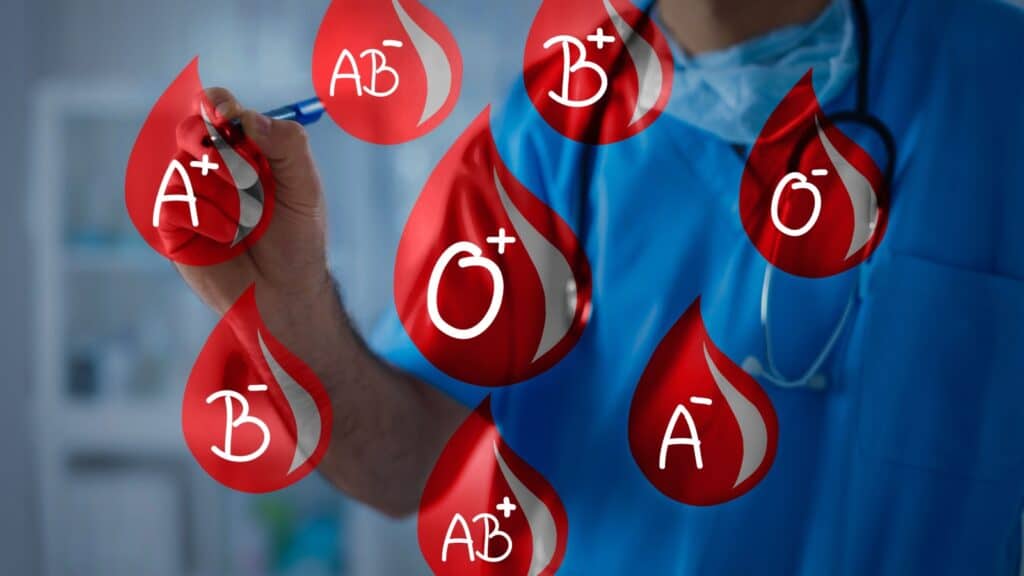Understanding Blood Type: Why It’s Important to Know
Do you know your blood type? It is a helpful personal medical fact to know, for emergency situations, blood donation, genetic issues, and other reasons as well. Here we explain what blood types are, why it is important to know, and how to find out.
What Are Blood Types?

Blood types are a classification system that categorizes blood based on the presence or absence of certain antigens and antibodies on the surface of red blood cells. The most well-known blood typing system is the ABO system, which classifies blood into four main types: A, B, AB, and O. These blood types are determined by the presence or absence of antigens A and B on the surface of red blood cells.
Blood Types Explained

The presence of antigen A on red blood cells indicates blood type A, while the presence of antigen B determines blood type B. If both antigens A and B are present, the blood type is AB. If neither antigen A nor B is present, the blood type is O.
How Is Blood Type Determined?

Blood typing is typically performed using a blood sample obtained via a simple blood draw and test. This blood sample is mixed with specific antibodies that react with the A and B antigens on the surface of red blood cells. Based on the reactions observed, the blood type of the individual will be determined.
Which Blood Type Is the Most Common?

Type O is the most common blood type among the general population, followed by type A, type B, and type AB.
While type O is the most common blood type globally, the distribution of blood types can vary among different populations and regions. Some ethnic groups may have a higher prevalence of certain blood types than others. For example, type B is more common in Asian populations, while type O is more prevalent among people of African descent.
Universal Donors Vs. Universal Recipients

Type O blood is considered the universal donor because it lacks both A and B antigens, making it compatible with all blood types during transfusions.
Conversely, type AB blood is known as the universal recipient because it has both A and B antigens and can receive blood from all blood types.
Why You Should Know Your Blood Type

Knowing your blood type is important for several reasons:
- Emergency Situations: In case of accidents, injuries, or medical emergencies where blood transfusions are necessary, knowing your blood type can ensure that you receive compatible blood. Transfusing incompatible blood can lead to severe reactions and potentially life-threatening complications.
- Medical Procedures: Before surgeries or medical procedures, healthcare providers may need to know your blood type to anticipate potential blood loss and prepare for any transfusions that might be required during or after the procedure.
- Pregnancy and Childbirth: Understanding your blood type is crucial during pregnancy, particularly if you are Rh-negative (more on Rh factor below). Incompatibility between the mother’s and baby’s blood types can lead to complications such as hemolytic disease of the newborn (HDN).
- Blood Donation: Knowing your blood type allows you to donate blood more effectively. Different blood types are in demand at different times, and blood banks often rely on specific blood types to meet patient needs. By knowing your blood type, you can donate blood when it’s most needed and potentially help save lives.
- Organ Transplants: Blood type compatibility is critical in organ transplantation. Matching the blood type of the donor and recipient helps minimize the risk of rejection and improves the success rate of organ transplants.
- Genetic Traits: Blood type can also provide information about genetic traits and susceptibility to certain diseases. For example, some blood types are associated with a higher risk of developing certain health conditions.
Know Your Rh Factor, Too

Within the ABO system, there’s also the Rh factor, also known as the Rhesus factor, as mentioned above. The Rh factor is a protein found on the surface of red blood cells.
If you have the Rh factor on the surface of your red blood cells, you are considered Rh-positive. If you lack the Rh factor, you are Rh-negative. The Rh factor is inherited from your parents, similar to how ABO blood types are inherited.
Rh Comes Into Play with Pregnancy

The Rh factor is significant primarily during pregnancy. If a woman who is Rh-negative becomes pregnant with a baby who is Rh-positive, there is a risk of Rh incompatibility between the mother and the fetus. This can occur if the baby’s blood enters the mother’s bloodstream, usually during childbirth, but sometimes during pregnancy, due to other factors such as trauma or invasive prenatal testing.
When Rh-negative blood is exposed to Rh-positive blood, the Rh-negative person’s immune system may produce antibodies against the Rh factor. These antibodies can cross the placenta and attack the red blood cells of a Rh-positive fetus in subsequent pregnancies, potentially leading to a condition called hemolytic disease of the newborn (HDN) or erythroblastosis fetalis. HDN can cause severe anemia, jaundice, and other complications in the newborn.
Rh-negative women who are pregnant with Rh-positive babies may receive injections of a medication called Rh immunoglobulin (RhIg) at specific times during pregnancy and after childbirth. RhIg works by preventing the mother’s immune system from producing antibodies against the Rh factor.
Rh Also Has To Be Considered During Transfusions

In addition to its importance in pregnancy, the Rh factor is also relevant in blood transfusions. Transfusion of Rh-positive blood to a Rh-negative person can lead to the production of Rh antibodies, potentially causing complications in future transfusions.
Your Blood Type Is Most Likely Known

Your blood type is typically determined shortly after birth as part of routine newborn screening tests. This process involves collecting a small blood sample, usually obtained from a heel prick, and analyzing it to determine the presence or absence of the specific antigens on the surface of red blood cells.
Your blood type can be determined at any age, but it is usually established early in life and remains constant throughout your lifetime.
How To Find Out Your Blood Type

There are a few ways you can find out your blood type:
- Ask Your Doctor: Your doctor may have your blood type on file, especially if you’ve had blood tests done in the past.
- Blood Donation Centers: When you donate blood, many blood donation centers will test your blood and inform you of your blood type. You can request this information from them.
- Lab Tests: You can ask your healthcare provider to order a blood type test for you.
- Direct-to-Consumer Testing: Some companies offer direct-to-consumer blood type testing kits that you can purchase online or at pharmacies. These kits usually involve collecting a small blood sample at home and sending it to a lab for analysis. Keep in mind that the accuracy and reliability of these tests may vary, so it’s essential to choose a reputable company.
- Prenatal Testing: If you’re pregnant or planning to become pregnant, your blood type will likely be tested as part of routine prenatal care.
How To Donate Blood

Donating blood is easy – and if you are able, it is highly encouraged that you do so:
- Find a Blood Donation Center: Locate a blood donation center or blood drive near you. You can check with local hospitals, blood banks, or organizations like the American Red Cross to find donation centers or upcoming blood drives.
- Donation: Once you’re cleared to donate, you’ll be directed to a donation area. A sterile needle will be inserted into a vein in your arm, and blood will be collected into a sterile bag. The process typically takes about 8-10 minutes.
- Rest and Refreshments: After donating blood, you’ll be encouraged to rest for a short time and enjoy refreshments provided by the donation center. This helps ensure you’re feeling well before leaving.
- Post-Donation Care: It’s essential to follow any post-donation instructions provided by the donation center. This may include avoiding strenuous activity for the rest of the day, staying hydrated, and avoiding alcohol consumption.
- Follow-Up: Some donation centers may contact you to provide information about your blood donation, such as your blood type or if any issues were identified during screening.
The Takeaway

Knowing your blood type is essential for ensuring your health and safety in various medical situations, from emergencies to routine healthcare procedures. It enables healthcare providers to make informed decisions and provide appropriate treatment tailored to your individual needs.
Additionally, understanding blood types is vital for blood donation and ensuring a stable blood supply for hospitals and healthcare facilities. Donating blood is a generous act that can save lives, so if you’re eligible and able to donate, it’s a valuable contribution to your community’s health and well-being.







